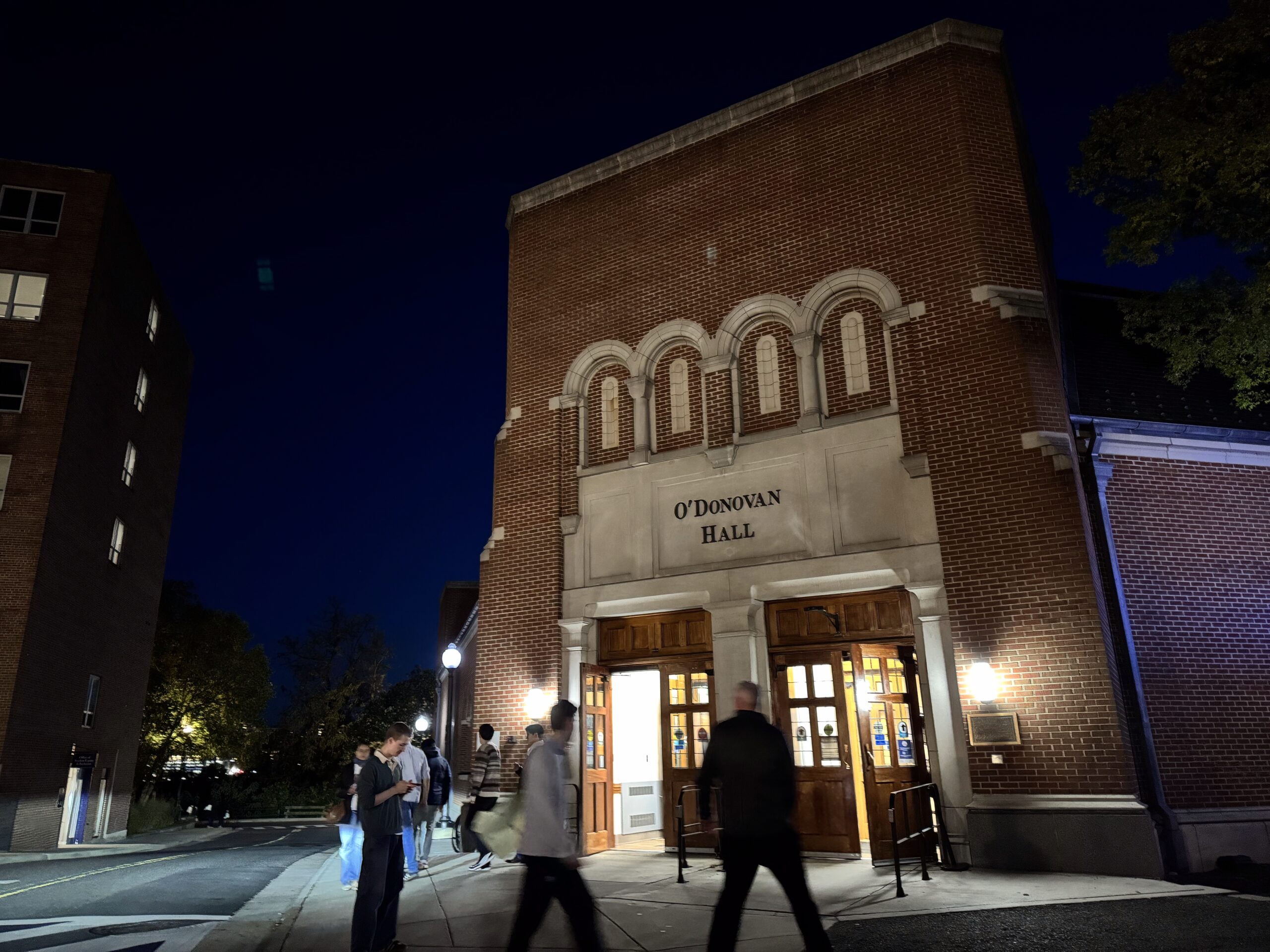This past weekend, Leo O’Donovan dining hall (Leo’s) plant power and halal stations were open through the entire weekend for the first time in over a month.
The weekend before last, the stations were only open on Sunday. For the prior month they had remained closed through the weekend, forcing students who relied on a plant-based or halal diet to search elsewhere for their meals.
Meriam Ahmad (SFS ’26), GUSA senator and head student representative of the Student Dining Committee, explained that the closure stemmed from administrative changes in Hoya Hospitality.
“Admin expressed to us that, due to many of them being new in their positions, they did not know what the procedure had been in previous years,” Ahmad wrote in an email to the Voice. “Plant power being closed on the weekends this semester was a more extreme example of this and something that was quickly reversed once we brought it to the attention of admin during our last meeting on September 18.”
Hoya Hospitality is Georgetown University’s dining operation that controls and coordinates food on locations across campus, such as Epicurean (Epi’s) and Leo’s. Aramark, the company contracted by the university to provide food and services for dining on campus, manages Hoya Hospitality.
Aramark did not respond to requests for comment.
Amal Sharfi (CAS ’26), a Muslim student who follows a halal diet, said the weekend limitations disappointed her.
“I feel like the food options on the weekends, I’ve always found to be a bit limited, and to see [the allergen and halal] stations close as well really limited my options,” she said.
Sanjay Rajesh (CAS ’28), who follows a vegetarian diet, said it was disheartening to hear that the closing of the stations was due to miscommunication with new administrative leaders.
“I would hope that the administration and in general Hoya Hospitality takes some considerations to dietary preference,” he said.
For Rajesh, the closure itself went unnoticed. Downstairs Leo’s typically offers very little variety for students with particular restrictions and—up until recently—offered the same meals for both lunch and dinner.
On the weekends especially, he gets his meals at Epi’s. Although he mentions dining there comes with its own set of flaws—oily food to be specific—Rajesh said he would take that any day over Leo’s lack of choices.
“Georgetown lacks high-quality vegetarian options at times, which makes it a lot harder to stick with a regular Leo’s diet,” Rajesh said. “Conveniently, I would much prefer to eat at Leo’s. It’s closer to my dorm, it’s where most of my other friends get food.”
In a statement about the dining accommodations process on the Hoya Eats website, Hoya Hospitality emphasizes the importance of fresh and accessible food.
“Georgetown is committed to supporting students’ health and well-being through on-campus dining options that promote access to a variety of healthy, fresh, and nutritious foods that meet students’ dietary needs,” the site reads. “Consistent access to a variety of nutritious foods is one of the foundations for successful learning and on-campus dining provides students with a source of community and shared experience.”
Vegetarian student Merel Halfhide (CAS ’27) has similar struggles finding food at downstairs Leo’s, even before the closure.
“It was very difficult last year as well, even when the station is open, because sometimes they don’t have a protein-like option at the vegan station,” Halfhide said. “The only option is maybe some beans or tofu, but I feel like I eat tofu almost every day.”
In order to combat the lack of choices she found at Leo’s, Halfhide requested to get off the required dining plan for juniors by contacting Hoya Hospitality, but was denied.
“It’s kind of hard to be vegetarian on this meal plan, because sometimes you don’t have a lot of options, and they wouldn’t let me downgrade to cook at home,” Halfhide said. “So I think it’s extra interesting that now they closed the [plant power] station on the weekend, given that they wouldn’t let me [downgrade].”
In the same statement concerning accommodations, Hoya Hospitality emphasized the importance of meal plans on campus.
“Georgetown requires all residential students to have a campus meal plan in order to support their on-campus living and learning success,” the site reads. “The University can meet the vast majority of students’ dining needs — including disability-related or religious dietary requirements — through its extensive dining options, or through reasonable accommodations.”
During the weekends when the plant power station was closed, Halfhide said she would often have to put together food from five different stations in order to have a balanced meal.
“It’s definitely harder when the veggie station is closed because I think when it’s open, I usually just go for the veggie station just because I know I can just eat everything,” she said.
Sharfi echoed similar frustrations with finding suitable foods to eat even when the halal station is open. According to Sharfi, members of Muslim Life on Georgetown’s campus met with leaders from Hoya Hospitality to create a guide of what foods are halal on campus, but the list is ever-changing.
“I think if we could walk into Leo’s and see on the screen, kind of like how it shows what’s vegetarian or what’s dairy free, if they just added another symbol for something being halal, I think that would honestly solve a lot of the barriers that we face right now,” Sharfi said.
She said that she, along with other students, only recently learned that the chicken at Royal Jacket was halal.
“We just never knew,” Sharfi said. “So I just wish that clear communication had been there from the beginning.”
At the dining committee meetings, Ahmad explained she sees many students upset about the lack of consistency from semester to semester. Many of the topics they tackle on the agenda are getting back what students miss, such as scoop ice cream in downstairs Leo’s. However, she also watches the administration’s engagement with students and believes they are receptive to students’ concerns at the meetings.
“In my view, admin has been quite responsive to the committee’s simpler requests, such as getting hot chai at Whisk, having yogurt available all day at downstairs Leo’s,” she wrote. “It has been more difficult to get larger requests, such as having Royal Jacket open for lunch on Saturday, but we know that these things take both time and continued student engagement.”
After responding to students’ concerns, Hoya Hospitality has also resumed offering different meals for lunch and dinner at plant power and halal.The stations are now only closed from 2:30-4:00 p.m. on weekends.
For Sharfi, now in her senior year at Georgetown, the reopening of the stations resembles other positive dining changes she has witnessed over her time on campus, and she describes her overall experience with eating at Georgetown as “really good.”
“Since freshman year, Leo’s has gotten consistently better and better,” she said. “I trust that they’ve been working to make positive changes throughout the three or four years I’ve been here.”
Correction: this article was slightly edited to correct the spelling of Meriam Ahmad’s last name.





